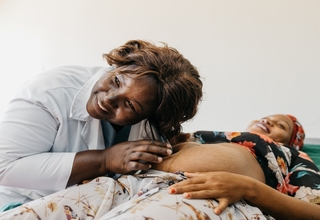Uwamwiza Victoria, 33 and her husband Iyiragiye Jeremie, 33, live in Village 12, community 10 in Mahama refugee camp. The couple has six children and had visited the health center to test pregnancy of their seventh child.
Speaking to them about their need to use family planning considering the hard conditions in the camp, Uwamwiza said she first heard about family planning when she arrived in the camp but never consulted the husband because she knew his response.
“Back in Burundi, we believed in having many children as a big asset and no one sensitized us about family planning. Our religion prohibits us saying children are a blessing from God and he who gives will provide for them. The community health workers and health providers have sensitized us and we have taken a decision to have this as our last child in case I’m tested pregnant” Uwamwiza says.
Nyirarukundo Jeanne, a midwife at ARC health center has worked in the refugee camp for two and half years but finds culture and religious teachings as the biggest barriers for refugees to access family planning.
“Despite the constant campaigns we hold in the camp and daily morning sessions we have with couples who come for tests and mothers in maternity after delivery of their babies, most of them still believe in their religions and stick to their culture of having many children including those that are educated” Nyirarukundo sadly says. In only the month of November, 140 new pregnancies have been registered in addition to other 800 pregnancies on follow up.
Nyirarukundo demonstrates the need for continued sensitization about family planning for not only women only but both married partners including their husbands as well to improve their knowledge on health and financial consequences of having many children without sufficient spacing especially in such conditions. Mukabalisa Eugenie, on the contrary, knows about family planning, because of information she got from community health workers when she arrived in Mahama camp.
“At the beginning of our marriage, I always thought of having eight children because children were seen as a big asset. When I arrived here, I learned about the importance of child spacing and having the number of children that my husband and I are able to look after. I’ve joined the community health workers to help sensitize fellow women to stop their cultural beliefs and use family planning” says Mukabalisa.
To complement to the regular campaigns in the camp, the health workers have established strategies to increase family planning uptake such us inclusion of family planning in nutrition and vaccination program, door to door sensitization, HIV/AIDS test before pregnancy test with accompaniment of husbands.




